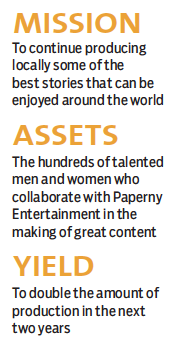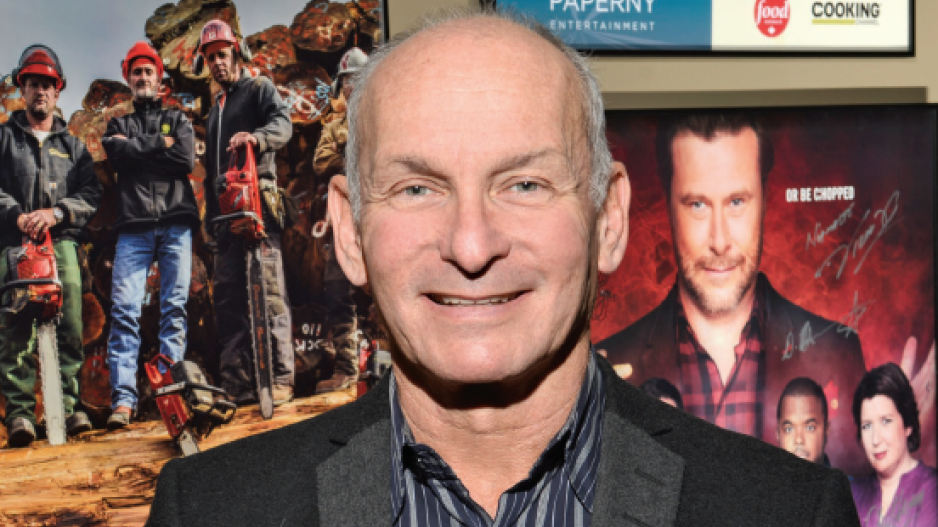As a child growing up in Calgary, David Paperny used to watch The National on CBC Television, marvelling at how the network’s mini-documentary news reports could get to the heart of a subject.
“I decided then that’s what I wanted to do,” said the Vancouver film and television producer, speaking from his second-floor office at Paperny Entertainment.
“It was great journalism for Canadians to consume, stories about us and about the world through our lens.”
Not only did Paperny go on to lead one of the country’s most successful production houses, he got to work with Barbara Frum, one of his idols, in her final days while both were at the CBC.
Born and raised in Calgary, Paperny grew up with art and commerce in the household. His mother, Myra, wrote children’s books. His father, Maurice, was a toy wholesaler, and Paperny spent summers as one of his dad’s salesmen.
“I credit any success I have pitching shows to broadcasters to those early days trying to convince pharmacists with a toy section to buy Silly Putty or hula hoops,” he said.
Learning communications at the University of Toronto, he got his MA at Philadelphia’s Annenberg School for Communication, where he met his wife, Audrey Mehler.
They married and moved to Toronto. In 1983 Paperny went to work at the CBC as a researcher for What’s New, a current affairs show for youths.
He went on to produce and, in 1988, worked with Frum on The Journal.
When CBC opened up a documentary unit in Vancouver the following year, Paperny, Mehler and their two young children moved west.
The young producer knew that the best journalism gets to the essence of a subject or an issue by personalizing it for the audience, putting a human face to a story. With this in mind, he produced the The AIDS Diaries of Dr. Peter, a weekly part of CBC-TV news that ran from 1990 to 1992 until the subject, Dr. Peter Jepson-Young, died from the disease.
Back in the early 1990s, AIDS was misunderstood and a source of fear and shame.
Jepson-Young himself was fully in the closet, only coming out to his mother two weeks before the Diaries aired. Those segments personalized a terrible ailment, yet Paperny fought to put it on the screen.

“Every instalment was a battle,” recalled Paperny. “There were people in the newsroom who didn’t like seeing a gay guy talk every week. They saw it either as a death watch or as homosexual propaganda. I had to prove on a weekly basis that Peter had something relevant and new to say to justify the two minutes he took on the evening newscast every week.”
When HBO called to ask Paperny to edit the Diaries for a feature documentary, he went to New York and, using all the tapes he saved, made The Broadcast Tapes of Dr. Peter. It was nominated for a 1994 Academy Award.
Finding himself doing lead-ins to weather reports at the CBC (“a big comedown from the Oscars”), he left the Mother Corp. and formed David Paperny Films Inc.
“Audrey and I worked from home for the next five or six years making one or two documentaries a year,” he said. “It was a great way for Audrey and I to cut our teeth in business, doing low-budget, one-off documentaries. I sold a lot of those early shows to History Television.”
At first, he was a director for hire, but after a while he wanted more control over content. He and Mehler became producers, getting advice from his father’s first cousin, Vancouver producer and now business partner Cal Shumiatcher.
The move to production came not only as specialty cable channels were springing up all over the Canadian TV dial, but also when Canadian content rules dictated that a certain percentage of their shows had to be made in Canada.
That was both good, in terms of work opportunities, and bad, for how Canadian producers were viewed.
“For many years we felt the broadcasters looked to us as a cost of doing business. They didn’t look to us for hit programming. They looked at their American shows as their bread and butter, and Canadian shows were the requirement for their licence, and not necessarily a generator of profit.
“That’s changed over the past few years.”
It certainly has. The three partners at Paperny Entertainment – Paperny, Mehler and Shumiatcher – have a knack for coming up with show ideas that capture viewers’ attention.
Leaving the one-off documentary aside, they have focused on documentary series, reality shows and food shows that, though often regional in focus, attract viewers both across the country and outside Canada.
Timber Kings, filmed in Williams Lake, was the most popular show ever on HGTV Canada and has good numbers on Discovery in the U.S. Chopped Canada is a huge hit on the Food Network (Canada and the U.S.). Yukon Gold, Cold Water Cowboys and Eat St. also have healthy audiences in both countries.
Oprah Winfrey’s network OWN has ordered eight episodes of 2 Fat 2 Fly, a series about two men who run a chicken-wing enterprise.
The recession of 2008-10 hit production companies hard, and Paperny had to lay off staff. But rather than fold, the partners expanded, doubling their investment in development, opening an office in New York in 2011 and another in Toronto in 2013. All this was designed to tap into the more lucrative U.S. market.
In July, Toronto-based Entertainment One bought Paperny Entertainment for $29 million, making no changes to personnel, which includes 35 on staff and several hundred on contract. Paperny productions can now tap into eOne’s large international distribution and its co-production partners.
“Paperny caught my attention many years ago with the series Kink [2001-06] and The Week the Women Went [2007-08],” said Margaret O’Brien, president, Canada, and COO of eOne Television. “Ever since that time, you couldn’t take your eyes off the work they were doing. Their work progressed with the transformation of factual entertainment into hits like Yukon Gold, Cold Water Cowboys and Timber Kings. Paperny is an incredibly creative company that makes great shows that sell internationally. [The deal] was a no-brainer.”
Paperny and Mehler have three grown children, and often retreat to their second residence, on Hornby Island. •




